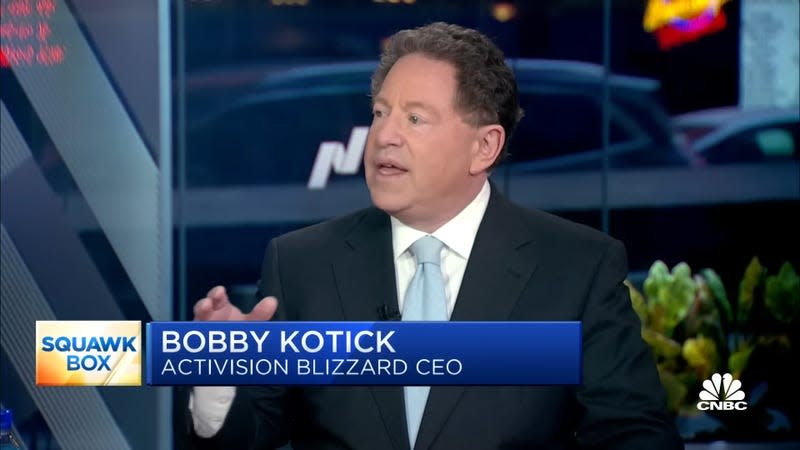Bobby Kotick Is Stoking Chinese Fear To Champion The Microsoft Acquisition

In order to ease UK regulators’ reluctance to approve the Microsoft acquisition, Activision Blizzard CEO Bobby Kotick went on CNBC to make a case for the merger. His comments about the UK becoming “Death Valley” if the merger was not approved have earned him well-deserved ridicule. But maybe we should all be a little skeptical when one of the most controversial game executives in recent history decides to get on national television. This was a calculated move to get European regulators on his side with a potent political threat: the possibility of Asian technological superiority.
Activision Blizzard CEO explains why Tencent and ByteDance are the best companies in the world
When the CNBC interviewer asked Kotick about the competitiveness of the console market after the acquisition, the CEO pivoted deftly to the bigger problem in the room: Those darned Asian companies that have made too many dollars, pounds, and euros. How dare they!
Read more
“Sony Studios goes back 80 years. Nintendo has the very best characters that exist in video games. I think [European regulators] are a little confused about where competition is today. The best companies in the world right now are companies like Tencent and ByteDance. And these are all companies that have protected markets. We struggle to enter the Japanese market, we can’t enter the Chinese market without a joint venture partner. The competition isn’t actually European companies and American companies, it’s really those companies in Japan and China.”
After 14 years, Activision Blizzard recently separated from their Chinese partner NetEase. As a result, popular games such as Overwatch and World of Warcraft are no longer playable in China. Kotaku reached out to Activision Blizzard to ask about the unique struggles they had in selling games in Japan, and which of the company’s products were intended to compete against Nintendo. We did not receive a comment by the time of publication.
There’s a reason that the CEO of Activision Blizzard wants to give the impression that the U.S. and Europe are united against the two entirely different nations of China and Japan. Microsoft has been struggling to appease European regulators who recognize that the best interests of an American technology company aren’t necessarily within the best interests of European consumers. And he’s doing that by reviving the 80s xenophobia playbook against Japanese companies that were seen as stealing western manufacturing jobs.
And that’s what his PR spin about “Death Valley” is ultimately about: Keeping market dominance within the white nations that need high-paying jobs. “If you’re the UK, and you have an incredibly educated workforce, you have a lot of technical talent, places like Cambridge, where the best AI and machine learning is, I would think you would want to embrace a transaction like this, where you’re gonna see job creation and opportunity,” he said. Unrelatedly, Microsoft had recently slashed 10,000 jobs across its workforce.
While Kotick didn’t specify how many jobs Microsoft would create after he was no longer CEO, he seemed confident that it was inherently better for Europeans to be employed by Americans. As if Microsoft wasn’t ultimately a tech company like any other—it represents the “liberatory” free market values of the red, white, and blue. “It isn’t really at all whether it’s Sony’s or Microsoft’s platform,” Kotick says. ”It’s really about the future of technology.”
Kotick has been making headlines in recent years for allegedly threatening to kill an assistant, covering up workplace issues at Activision Blizzard, and being the subject of a restraining order. But isn’t all that a lesser evil compared to the looming possibility of China and Japan pulling ahead in the tech race? He certainly would monetarily benefit from regulators thinking so. Kotick is due for a massive payout of potentially $22 million if Microsoft manages to acquire Activision Blizzard. And he’ll do anything for that golden parachute, even if it means appealing to Europe’s ugliest nationalist anxieties.
Fortunately, his implicit threats don’t seem to have worked very well.
Update: 2/8/2023 at 2:24 P.M. E.T.:
A spokesperson for Activision Blizzard has provided the following comment:
Regarding NetEase, Blizzard and NetEase attempted a final negotiation to explore a 6-month extension. We proposed keeping the status quo to give players continuity, but NetEase declined our offer to extend. Our commitment to players on mainland China remains strong as we continue to work with Tencent to distribute Call of Duty Mobile. We have been meeting with several potential partners who share our player-first values, to resume gameplay for Blizzard’s iconic franchises.
More from Kotaku
Sign up for Kotaku's Newsletter. For the latest news, Facebook, Twitter and Instagram.


